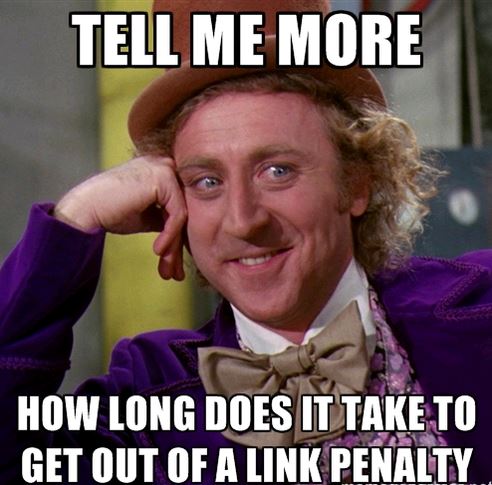Recently, the company Thumbtack appeared on two of my client’s organic result pages.
I added my client to Thumbtack thinking, nice local citation. About a week after setting up the citation, I get this:
Hi [client],
You can get 30 more points if you add a link to your Thumbtack service profile on your personal website. Instructions are below.
Your profile will feature a profile badge.
Let us know if you have any questions,
– The Thumbtack Support Team
Instructions:
1. Copy and paste your profile link to your website with a description of your profile
<a href=”https://www.thumbtack.com/mo/kansas-city/personal-injury-lawyers/“>legal</a>
If you would prefer to add a button or a badge instead of a link, you get one here.
2. Once you are done, respond to this email with the URL of the link, badge, or button.
I’ll verify the link and will credit the points and badge to your profile.
This Strategy Violates Google’s Link Building Guidelines
The points they offer to clients who provide the links helps them rank in their system. They then ask for credit money in order for clients to bid on quotes with five others. Each credit is valued at $1-$5 based on the vertical.
My clients who are personal injury lawyers would have to pay ~$10 to bid on a lead with 5 other firms.
Google Investment
Further research shows that Google’s invested $100 million in Thumbtack:
http://www.bloomberg.com/news/articles/2014-08-20/google-capital-leads-100-million-investment-in-thumbtack
Looks like this profile was built and still dominates after all the Penguin updates.
http://www.semrush.com/info/thumbtack.com?db=us
Questions: Will Google punish a site if they have their hands in its pocket?
It remains to be seen whether Google acts on the information I have provided when I reported Thumbtack’s link acquisition tactics.
Have any of you come across a similar situation?
It seems to me that despite Google’s continuous protestations that organic search results are independently determined and not manipulated, this appears to be a way for Google to make money on organic traffic.
By providing companies in which they have a direct financial investment with superior positioning, Google can avoid the appearance of organic search results manipulation.
Thumbtack’s advantage in this case comes not from Google actively assisting them, but because Google permits them to violate the standards that punish our sites.
Thumbtack, in essence, has an exemption from applying white hat SEO tactics. They can be confident in pursuing tactics that allow them to rank without any fear of potential consequences.
Google Antitrust Issues
While antitrust efforts in America against Google’s abuse of its dominance in the search market have gone nowhere, there seems to be a more robust regulatory framework in Europe.
Hopefully, the antitrust challenges to Google’s modus operandi in Europe will wake up the Federal Trade Commission.
Lastly: http://thumbtack.pissedconsumer.com/ (Angry Consumers Abound)
Disclaimer:
The only links on this page that are actually Not Followed are Google’s links…
I mean Thumbtacks link…



Thumbtack is not the only one that is doing this. Avvo has been adding keyword links in their Avvo badges for some time now, and this has worked well for Avvo’s Google rankings.
Avvo states that adding an Avvo badge to your profile on your web site is part of completing your profile on Avvo. By doing this lawyers are really just adding links to Avvo, not filling out their profiles.
The interesting Google SEO issue is that when you go to get the html code to add the Avvo badge, it includes a keyword follow link that links to an Avvo lawyer listing page for that same keyword. Avvo does not explicitly tell you that you are adding this keyword link to an Avvo listing page when you are getting the code to add a profile badge to your web site (although if you can read html you would see the keyword text and link). But non-technical lawyers, as most lawyers are, who go to the Avvo badge/widget page will think they are just adding a link to their profile.
The Avvo badge is actually rendered in javascript. You can just remove the html keyword spam tag and the text completely from the raw html, and everything in the badge from a user perspective, the graphic, text and the link, still shows up through the javascript. This indicates that the only real purpose of the text link in the raw html is for Google SEO.
This was discussed on the Lawyerist site in a post titled “How the Avvo Badge Promotes Your Competition” (although the real title of the post should have been “How the Avvo Badge Promotes Avvo”).
https://lawyerist.com/78827/avvo-badge-website-hurting-online-marketing/
Avvo has been getting topic specific lawyer websites using topic specific lawyer keyword text links to link to topic specific Avvo lawyer listing pages.
This would be a great article.. the only thing is that credits and progress points are totally different things on Thumbtack. You use credits to bid on jobs, you use progress points to show potential customers how much effort was put into the profile. Now because of this article, Thumbtack has to hinder the amount of traffic going to the site damaging business owners that use it on a daily basis. Hopefully it’s only for a couple of days!
Yelp is evil…..
Hey asshole, your wonderful little article cost my business about $4k this week in revenue derived through Thumbtack. Hope you sleep well knowing you saved the world from all those links (while costing REAL businesses like mine an indefinite sum of money and possibly workers their jobs depending on how long this takes). P.S.: Progress points have no monetary value. They are quite useless in fact, having no apparent value other than some back-end, non client facing “my profile is better than yours” gratification. I believe you had that confused with credits. But by all means, lets insight problems for millions of small businesses with our mis-information. This is why idiots shouldn’t be allowed public forum.
How is this his fault? Google ultimately brought the hammer down. He brought light to a problem, Google investigated and found problems with a website they invested in and decided to punish it. Your anger is misdirected.
Also, have you ever heard of professionalism?
No. He’s an asshole. A major one. First and foremost the article is based more around the sensational notion that google and thumbtack are colluding together and essentially calling out google to force action upon the site by the conjecture that google’s profiting from it’s organic search. The title of the article itself is ‘Thumbtack – Is google making money on organic search?’
This is hardly objective reporting and is more in the vein of the New York Post or other like-written garbage.
Secondly, the following excerpt postures thumbtack’s business model in an incredibly unflattering manner and suggests that the point system they were rewarding people was part of some fixed, linear march, towards getting peoples money. It’s not. You can buy credits at any time you want and the points given towards your profile (which are entirely useless by the way, and I say this as a thumbtack professional) are wholly irrespective of their monetary mechanism. The points, I maintain, once again, are useless. They amount to nothing other than decor. Donnie Strompf claims the points help one rank in thumbtack’s system. This is untrue. Entirely. There is no thumbtack ranking system and all the professionals contained therein are algorithmically equal. This was intensely irresponsible of the author to make this statement without prior investigation or any clear understanding of how thumbtack works.
Like. Egregiously, intensely, terrifyingly irresponsible. If the author was actually a journalist, instead of a pretend one, for a legitimate news source, he’d be fired over such a claim.
‘The points they offer to clients who provide the links helps them rank in their system.’
They then ask for credit money in order for clients to bid on quotes with five others. Each credit is valued at $1-$5 based on the vertical.’
My clients who are PI lawyers would have to pay ~$10 to bid on a lead with 5 other firms.’
Thirdly, OH. MY. GOD. PEOPLE PAYING FOR LEADS! THE WORLD IS COMING TO AN END!
What business doesn’t pay for leads? Your clients are lawyers who are paying YOU for leads. That’s all SEO is, after all. Just getting to the top of the heap in order to attract more hooks. And on top of that ten dollars towards a lead for a legal firm is crap.
And lastly, as far as search relevance goes, the simple fact that the link is being placed there in the first place is superseded by the idea that to do so you actually have to *be* a professional that can fulfill a searched for request. These aren’t third party tags placed on some site that has nothing to do with the service being searched for. The links themselves are guaranteed to come from a professional that can be added to a dataset in order to better help the end search engine user efficiently find a solution to his or her problem; whether it be legal or lawncare. This isn’t link spam.
As far as the marketplace goes, it is now smaller than it used to be without thumbtack’s massive bank of professionals in google’s returned results; meaning that the user as well, in his or her search for local services, has less options in finding someone efficiently and at the best price. They’re now more subject to whoever has the most money for Adwords and SEO campaigning and when searching for local services will find themselves subject to more fixed, non-competitive pricing.
The bottom line is that this article, which is slanted and suggestive as fuck, hurt far more people than just the individuals at thumbtack. This article is costing hundreds, if not thousands, if not tens of thousands of people, a ton of time, a ton of money, and a ton of duress.
Donnie Strompf, in his desire to be really cool, smart, and sleuthy, is costing people their jobs.
Way to go, Donnie. Way to stick up for the every man.
Two words: UNNATURAL LINKS look up Google’s definition in their TERMS OF SERVICE
So, what you’re saying is, is Google saw this article and instantly punished them without doing any research? Again, you guys are missing the point that Google definitely saw something wrong with what Thumbtack was doing. Even if Donnie was wrong about a few things (a lot of this is about how people are interpreting the points and badge things), Google still found something that didn’t follow their best practices.
Also, this is just a blog. Nowhere does this claim to be some sort of journalistic publication. Donnie drew his own conclusions, some of which aren’t right, but nowhere did he claim everything he wrote was the truth.
I suggest reading some articles about this situation that outline what exactly Thumbtack did was wrong and why it was. Reading one blog post and doing no further research makes you look bad, especially when you’re shooting the messenger without acknowledging it.
I will reiterate one more time: Google is still the one who hands out the punishments, and if you think they blindly punished Thumbtack because of one blog post, you need to re-evaluate something.
I’m sort’ve over it at this point. I do think that because the article accuses google of colluding with thumbtack and profiting from it’s own organic search that google in turn became somewhat hypersensitive over the issue and had its hand forced. Thumbtack’s backlink gathering method isn’t exactly a new thing and they’re not the first site to do it.
I do think the article acted as an impetus. The blog was a hatchet job to begin with; with both the title, the url link (really-google), and the end citation (pissedconsumer.com). If google gave thumbtack 100 million dollars in 2014, they wouldn’t have done so blindly. They had to have looked at their books and saw that thumbtack was getting a lot of money from a lot of people in the freelancing and local services industry; money that is now not being gotten by thumbtack and not being segued into jobs by the couple-hundred thousand users in it’s database.
The site, while not a household name, is a fairly large source of business for a sizable group of people.
Here’s just one such article on the issue: https://fstoppers.com/apps/popular-freelance-site-thumbtack-removed-google-causing-photographers-hurt-73351?utm_source=FS_RSS&utm_medium=RSS&utm_campaign=Main_RSS
And that’s just one industry. Thumbtack covered hundreds of professions all over the country. Given that one of it’s cofounders openly accredited this article to the manual action, I can’t imagine Mr Strompf is the most liked person on the internet right now by the local services community and subsequently imagine his inbox isn’t the most pleasant looking place in the world.
He completely misrepresented Thumbtack’s process on gathering links. Thumbtack does not, nor did they ever compensate users for adding links. Further, progress points in no way assist pros in becomming more successful on Thumbtack. The key to being successful on Thumbtack is prompt quoting of requests, among other things. The same requests are sent to all users in the relevant category regardless of the number of points, the length of time on the system, number of reviews or anything else. Progress points, in my personal experience on the site, are simply used to evaluate one’s own profile strength which helps with conversions (more points equals a stronger, more complete profile equals increased conversions). I have a link on my site because I like the service, not because of useless points.
Speaking to professionalism, why don’t you ask the employee of my firm brought on just to keep up with work generated from Thumbtack how they feel. Is it I who is unprofessional, or he who utilized public forum to spew inaccurate information. If it is affecting me and my employees, imagine how many others are affected. Of course no one cares about that. Now excuse me while I go unprofessionally push my already over-worked marketing team to generate enough business to keep this man earning enough to feed his children.
You put all your eggs in the Thumbtack basket then you are a lazy dumbass. Quit bitching about people losing their jobs and do a better one yourself.
I’m going to re-post my response to another comment:
So, what you’re saying is, is Google saw this article and instantly punished them without doing any research? Again, you guys are missing the point that Google definitely saw something wrong with what Thumbtack was doing. Even if Donnie was wrong about a few things (a lot of this is about how people are interpreting the points and badge things), Google still found something that didn’t follow their best practices.
Also, this is just a blog. Nowhere does this claim to be some sort of journalistic publication. Donnie drew his own conclusions, some of which aren’t right, but nowhere did he claim everything he wrote was the truth.
I suggest reading some articles about this situation that outline what exactly Thumbtack did was wrong and why it was. Reading one blog post and doing no further research makes you look bad, especially when you’re shooting the messenger without acknowledging it.
I will reiterate one more time: Google is still the one who hands out the punishments, and if you think they blindly punished Thumbtack because of one blog post, you need to re-evaluate something.
Also, read this:
http://www.thesempost.com/thumbtack-google-manual-action-penalty-links/
“In fact, they specifically state that money doesn’t have to be exchanged in order for it to be considered a “link scheme” in the eyes of Google.
From the Link Schemes section of the Quality Guidelines.
The following are examples of link schemes which can negatively impact a site’s ranking in search results:
Buying or selling links that pass PageRank.
This includes exchanging money for links, or posts that contain links; exchanging goods or services for links; or sending someone a “free” product in exchange for them writing about it and including a link
They also include specifics about widgets as well, which badges would fall under as well.
Keyword-rich, hidden or low-quality links embedded in widgets that are distributed across various sites, for example:
Visitors to this page: 1,472
car insurance”
Obviously a value can be put on points. “cost my business about $4k this week”
Its a zero sum game, someone else made $4k.
Zomato is another major site that does this. Hardly any content is unique – they basically just incentive users to add their own (duplicate – already exists on the bloggers site) content for a link exchange. They also give the users extra points for it like this, so IMO link exchanges and these badge type thing are still alive and they do very well via incentives such as linkbacks and points. Boy they do very well from it. So it seems you just need to be unlucky like Thumbtack. Google aren’t really consistent in what they do – spamming, duplicating content, link swapping etc can still work.
So some of you are mad because Thumbtack lost ranking? Think of it like this: if I search for a roofer in my local area, shouldn’t roofing companies show up way before Thumbtack, Yellow pages, directory listings etc? If Thumbtack is doing something that artificially raises it’s rankings it should absolutely go to the back of the line.